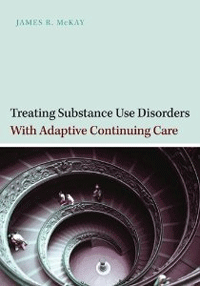Treating Substance Use Disorders with Adaptive Continuing Care

Treating Substance Use Disorders with Adaptive Continuing Care
By James R. McKay
American Psychological Association
Washington, D.C., 2009
Book’s focus will resonate with scientist-practitioners
Reviewed By James K. Luiselli, Ed.D., ABPP, BCBA-D
Some people who have substance use disorders (alcohol and drugs) respond positively to brief therapeutic intervention. However, other people are not able to sustain sobriety without intensive long-term treatment. As psychologist James R. McKay states in the introduction to his book, “There is now widespread acceptance that addiction is often a chronic problem characterized by increased vulnerability to relapse that can persist over many years.”
McKay wrote the book primarily for clinical researchers and program directors specializing in the treatment of substance use disorders and addictions. He also believes that clinicians will benefit from the book by learning about specific therapy methods, their effectiveness and how they are applied. True to its objectives, the book covers a lot of ground in the areas of program administration and large scale intervention.
Early chapters in the book introduce us to the concept of adaptive continuing care by tracing the evolution of contemporary substance use and addiction treatment. There has been a distinct shift from an acute care orientation to models variously described as aftercare, step-down care and continuum of care in which, quoting McKay, “patients receive interventions designed to help them manage their disorders more effectively over time.”
McKay details many of the components that comprise adaptive continuing care, including but not limited to, transitional services from residential treatment settings to community-based clinics, establishment of social support networks, participation in self-help groups and strategic relapse prevention. He closely examines the process of implementing comprehensive continuing care and importantly, the research evidence that has emerged from correlational, quasi-experimental and controlled research. Indeed, the book has a research focus that will resonate with scientist-practitioner professionals.
The substance use and addiction treatment approach presented in the book is not static. Rather, the concept of adaptive continuing care continues to expand within the criminal justice system, public assistance programs, child and youth services and vocational training job-sites. The task of coordinating these many avenues of service delivery is carefully considered throughout the book.
McKay’s clinical acumen and sophistication is evident in his presentation of therapeutic procedures common to adaptive continuing care. He advocates, among many recommendations, that clinicians embrace “low burden” interventions, computerized service delivery modalities, portable monitoring devices and procedural protocols that can be adapted as circumstances warrant. No single procedure dominates – instead, the best strategy is to combine multiple procedures that are matched to each person’s presenting problems.
This book is a must read for students, clinicians, researchers and program administrators concerned about substance use and addiction treatment. McKay is an exemplary research scientist and recognized expert who never strays from the empirical evidence. He has compiled a vast clinical and research literature in a book full of useful ideas and practical guidance that will challenge you to re-think established treatment approaches in favor of new and still evolving methods of care. A valuable resource, the book will inform the mental health community for years to come.
James K. Luiselli, Ed.D., ABPP, BCBA-D, is senior vice president, applied research, clinical training and peer review at the May Institute in Norwood, Mass.
Learn more about the book: Treating Substance Use Disorders With Adaptive Continuing Care
